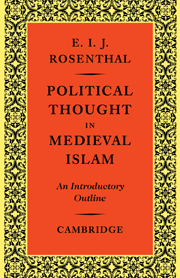Book contents
- Frontmatter
- Contents
- AUTHOR'S NOTE
- ABBREVIATIONS
- INTRODUCTION
- PART I CONSTITUTIONAL LAW AND MUSLIM HISTORY
- PART II THE PLATONIC LEGACY
- V POLITICAL PHILOSOPHY IN ISLAM
- VI AL FĀRĀBĪ: THE FOUNDATION
- VII IBN SĪNĀ: THE SYNTHESIS
- VIII IBN BĀJJA: INDIVIDUALIST DEVIATION
- IX IBN RUSHD: THE CONSUMMATION
- X AL-DAWWĀNĪ: APPLICATION AND INTEGRATION
- APPENDIX: SOME TURKISH VIEWS ON POLITICS
- NOTES
- GLOSSARY
- INDEX
IX - IBN RUSHD: THE CONSUMMATION
Published online by Cambridge University Press: 07 May 2010
- Frontmatter
- Contents
- AUTHOR'S NOTE
- ABBREVIATIONS
- INTRODUCTION
- PART I CONSTITUTIONAL LAW AND MUSLIM HISTORY
- PART II THE PLATONIC LEGACY
- V POLITICAL PHILOSOPHY IN ISLAM
- VI AL FĀRĀBĪ: THE FOUNDATION
- VII IBN SĪNĀ: THE SYNTHESIS
- VIII IBN BĀJJA: INDIVIDUALIST DEVIATION
- IX IBN RUSHD: THE CONSUMMATION
- X AL-DAWWĀNĪ: APPLICATION AND INTEGRATION
- APPENDIX: SOME TURKISH VIEWS ON POLITICS
- NOTES
- GLOSSARY
- INDEX
Summary
With Ibn Rushd (Averroes to the Schoolmen) we return to the main stream of Platonic tradition in political philosophy. His high regard for his compatriot Ibn Bājja did not hinder him from being critical of some of his opinions. He gave him full credit for his attempt to solve the intricate problem of the union between the human and the Active Intellect. In spite of Ibn Bājja's incomplete and often obscure treatment Ibn Rushd considers the K. ittiṣāl worthy of a commentary by himself, as I mentioned in the last chapter. In the context of our exposition of political thought in Islam two criticisms are relevant. In the epilogue to his commentary on Aristotle's Nicomachean Ethics, Ibn Rushd expresses surprise that Ibn Bājja believed that Plato's Republic offered a complete discussion of the ideal state, and he is sure that Ibn Bājja would not have made such a statement if he had been familiar with the completeness and perfection of Aristotle's treatment. This seems to reflect a different attitude to Plato on the part of Ibn Rushd, who almost always sides with Aristotle if he is at variance with Plato. For Ibn Rushd must have known from his study of Ibn Bājja's writings that Ibn Bājja knew both the Nicomachean Ethics and Al-Fārābī's commentary on it. Ibn Rushd is thinking in the first place of Aristotle's discussion of the imperfect states and of Plato's omission to speak of the third category of citizens in the same way as he had discussed the other two, the philosophers and the Guardians.
- Type
- Chapter
- Information
- Political Thought in Medieval IslamAn Introductory Outline, pp. 175 - 209Publisher: Cambridge University PressPrint publication year: 1958



